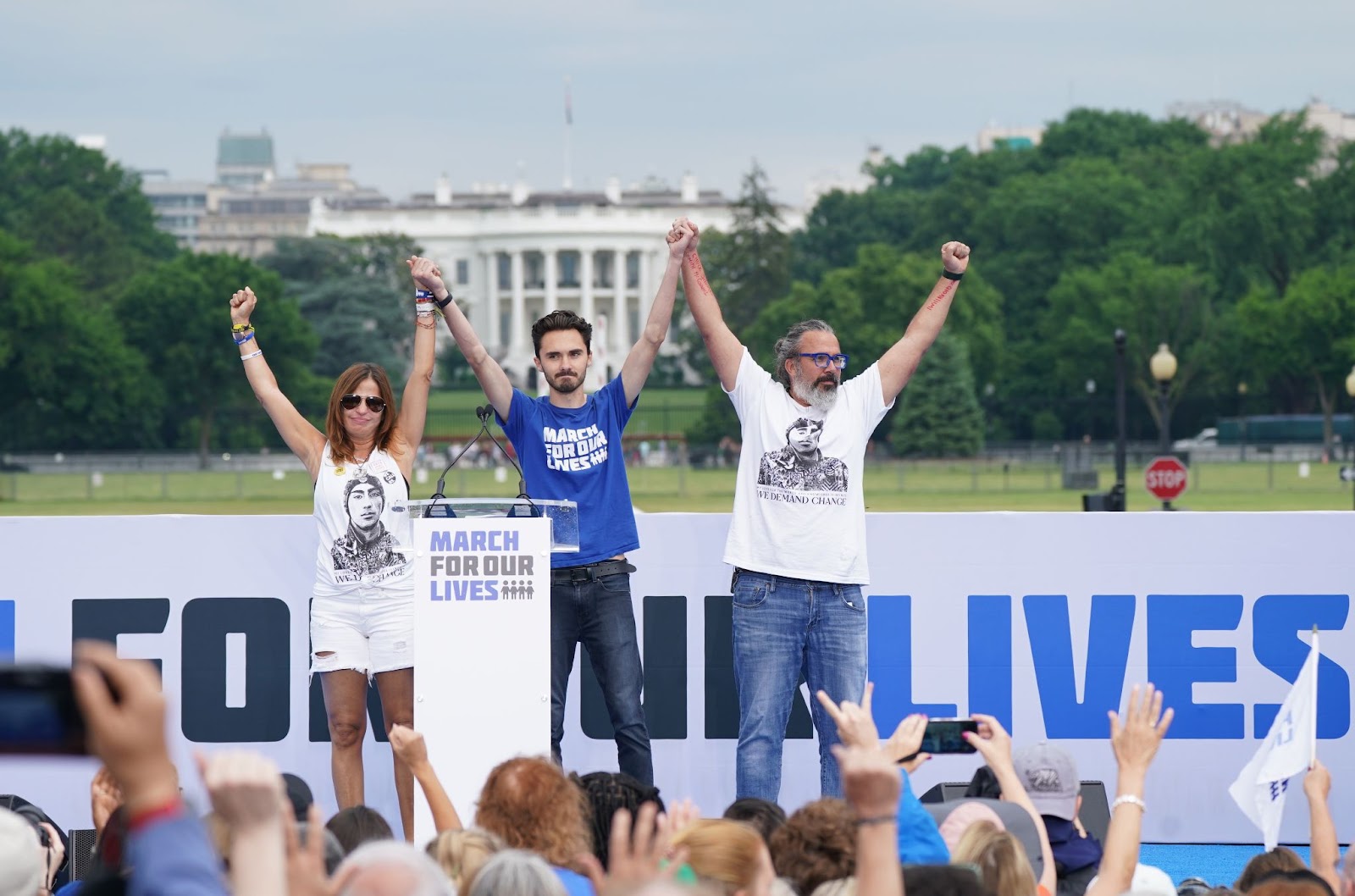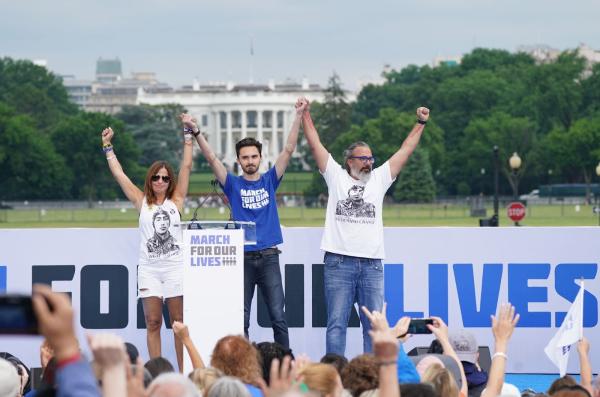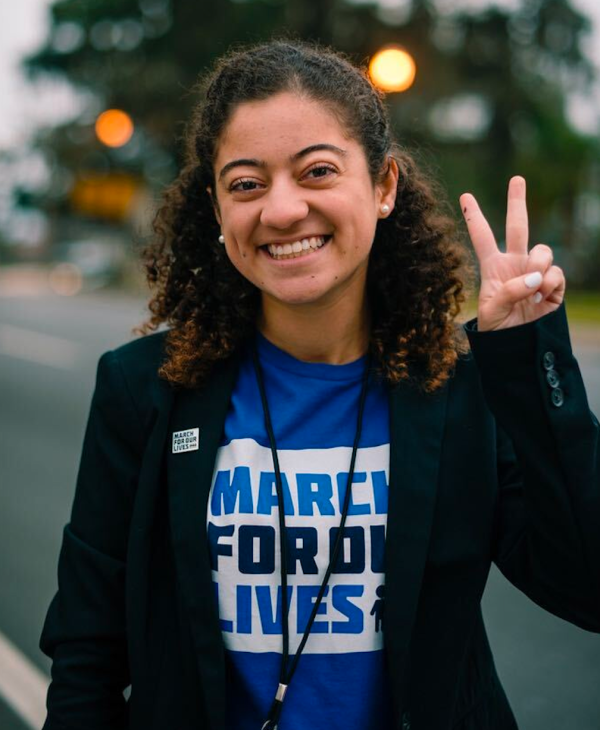KID REPORTERS’ NOTEBOOK
Calling for Change After Uvalde


David Hogg, a survivor of the 2018 Parkland school shooting, with the parents of Parkland victim Joaquin Oliver, at a June 11 gun-reform rally in Washington, D.C.
On May 24, a gunman opened fire at Robb Elementary School in Uvalde, Texas. Nineteen students and two teachers were killed. The slain children were between the ages of nine and eleven.
The deadly shooting sparked outrage across the United States. On June 11, an activist group called March For Our Lives (MFOL) sponsored rallies nationwide. MFOL was created by survivors of a deadly shooting at Marjory Stoneman Douglas High School in Parkland, Florida, in 2018.
On June 11, activists and survivors called for common-sense gun restrictions, universal background checks, and other measures to end gun violence. MFOL events allow people to peacefully demand gun-safety legislation. Their hope is to make the country safer, community by community.
NEW SENATE LEGISLATION
After the Uvalde shooting, members of the U.S. Senate met to draw up new gun-safety measures. Led by Democratic Senator Chris Murphy of Connecticut, the group crafted legislation that passed by a 64-34 vote on June 23.*
The bipartisan (from both parties) agreement underscored the seriousness of the current epidemic of gun violence in the U.S. In the past, many Senators, the majority of them Republican, have resisted calls to tighten gun restrictions. The new measures will enhance background checks, increase security in schools, and establish “red flag” laws that prevent people who have acted unlawfully from purchasing guns.
“For decades, the anti-gun violence movement has been met with obstacles and frustrations, and yet they’ve been tireless in their pursuit of change,” Murphy said in a statement after the bill passed. “This bill doesn’t include everything I want, but it will save countless lives and finally break a 30-year political logjam.”
According to the 2021 National Firearms Survey, more than 81.4 million Americans own guns. The youth-led Team Enough organization has found that 1,663 children and teens die from gun violence each year.

“Any action that saves even one life is successful,” says Serena Rodrigues, MFOL’s national coordinator.
FINDING “COMMON GROUND”
Serena Rodrigues, 23, is MFOL’s national coordinator. She joined me for an email interview on June 14, a few days after the nationwide rallies. At that point, the Senate was still debating gun-reform legislation. Our interview has been lightly edited for length and clarity.
What did MFOL hope to accomplish on June 11?
Tens of thousands of supporters joined us, marching to demand action. Our message to elected leaders was simple: Do your jobs, and keep us safe. We’re happy that the Senate announced the framework for a bipartisan gun-reform bill. Although it falls short of what we’d like to see, this is a step in the right direction. Any action that saves even one life is successful for us.
How can you have so much public support from Americans, and yet the Senate has so far refused to act?
As we saw this past weekend and in 2018, an overwhelming majority of Americans support some form of gun reform. Unfortunately, many of our elected officials refuse to listen and instead prioritize private interests such as the National Rifle Association (NRA). [The NRA is a gun-rights lobbying group that contributes to the election funds of lawmakers.]
Do you think gun control should be a state or national issue?
Both. After we marched in 2018, more than 150 life-saving laws were passed in several states. Florida tightened purchasing requirements and raised the minimum age to own firearms. Virginia now requires universal background checks for all firearm sales. And Colorado prohibits firearms at election polling sites. Additionally, in 2021, at least 12 states invested in community violence intervention as a way to reduce everyday shootings. While we’re proud of these efforts, federal policies are also needed so that people in all 50 states and the District of Columbia can feel safe in their communities.
What message should young people take away from the June 11 rallies?
Despite our young age, we have already made a difference. After we marched in 2018, multiple states passed gun-reform legislation, saving countless lives. We helped register hundreds of thousands of young people to vote, achieving the highest-ever youth voter turnout in a midterm election.
You’re never too young to make a difference. We hope the weekend of events inspired the next generation to demand that their voices are heard. Our efforts over the past four years made this moment feel different. Instead of lawmakers running from these tragedies and hiding behind the NRA, they’re reaching across the aisle to find common ground.
* Editor’s Note: On June 24, the House of Representatives passed the Bipartisan Safer Communities Act, which the Senate had passed on June 23. On June 25, President Joseph R. Biden signed the bill into law.
